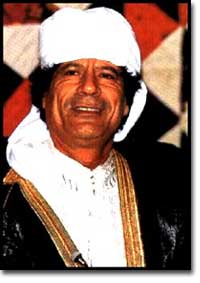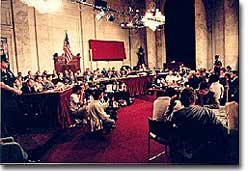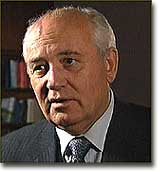59c. Foreign and Domestic Entanglements

U.S. planes attacked Libya in 1986 after evidence surfaced that Libyan terrorists were responsible for a discotheque bombing in West Berlin. Libyan leader Muammar el-Qaddafi (above) survived the attack, although his home was targeted.
Ronald Reagan, Cold Warrior.
Before he became President, he set the tone for relations with the Soviet Union by labeling the USSR an "evil empire." Around the world, communism seemed to be spreading. Soviet troops were in Afghanistan. Nicaragua was led by a Soviet-backed Sandinista government. Communist guerillas threatened to take over in neighboring El Salvador. Cuban-backed troops waged a successful insurgency in Angola. The age of détente was over.
Reagan hoped to negotiate with the Soviet Union, but believed he could only achieve concessions if dealing from a position of superiority. His increase in military spending would force a similar increase on the part of the Soviet rivals. In addition to upgrading all three branches of the American strategic defense, he proposed a bold new scheme to defend the United States mainland from any incoming ballistic missiles. This Strategic Defense Initiative (SDI) drew criticism from liberal Democrats who deemed it too costly and from scientists who questioned its feasibility.

The Iran-Contra Committee convened in 1987 in an attempt to learn more about the secret funding of the Nicaraguan contras. No link could be made to President Reagan, who replied, "I don't remember" to most questions about his involvement.
When Mikhail Gorbachev assumed leadership of the USSR in 1985, proclaiming a new policy of openness, Reagan believed it was time to act. The two leaders agreed in principle to an Intermediate Nuclear Forces treaty in 1987, which for the first time eliminated an entire class of existing nuclear weapons.
Around the globe, Reagan was determined to vanquish the specter of Vietnam. He believed the United States could ill afford to sit passively while communism expanded aggressively. He announced the Reagan Doctrine, which pledged American support to "freedom fighters" opposing Communism any where on the globe. Funds and CIA training were awarded to the government of El Salvador to help defeat communist guerillas. After left-leaning revolutionaries took over the island of Grenada in 1983, Reagan dispatched the Marines to install a US-friendly regime. The United States gave support to the mujahedeen rebels who fought against Soviet occupation of Afghanistan.
Another international menace was state-sponsored terrorism. In October 1983, 239 Marines were killed in Lebanon by a suicide bomber. Governments such as Syria, Libya, and Iran were suspected to training terrorist groups on their own soil. Reagan warned the nations of the world that if the United States could ever prove a link between an act of terrorism and a foreign government, there would be serious consequences. When the CIA linked the bombing of a West Berlin discotheque to the government of Libya, Reagan sprung into action. U.S. planes retaliated in April 1986 by bombing Libya, including the home of its leader, Muammar el-Qaddafi.

The "glasnost" (openness) and "perestroika" (reform) of Mikhail Gorbachev's term as Soviet Premier led to lessened tensions and a better dialogue between the U.S. and USSR.
Terrorism and anti-Communism combined to confront Reagan with his worst domestic scandal. In November 1986, the press reported that American military supplies had been secretly sold to archenemy Iran in exchange for their support for the release of American hostages held in Lebanon. As the story unraveled, it was revealed that a National Security Council aide named Oliver North diverted proceeds from the Iran deal to support the Nicaraguan contras, who fought against the Sandinista government.
The Congress had expressly forbidden such aid, but high-level Reagan Administration officials had proceeded nonetheless. Documents were shredded to mask the paper trail in the White House. No connection to between the scandal and President Reagan was ever proven. When asked about his knowledge of the Iran-Contra affair, Reagan repeatedly replied: "I don't remember." Although no charges were ever raised, the "Teflon President" was somewhat smeared by the ugly mess in the White House.






